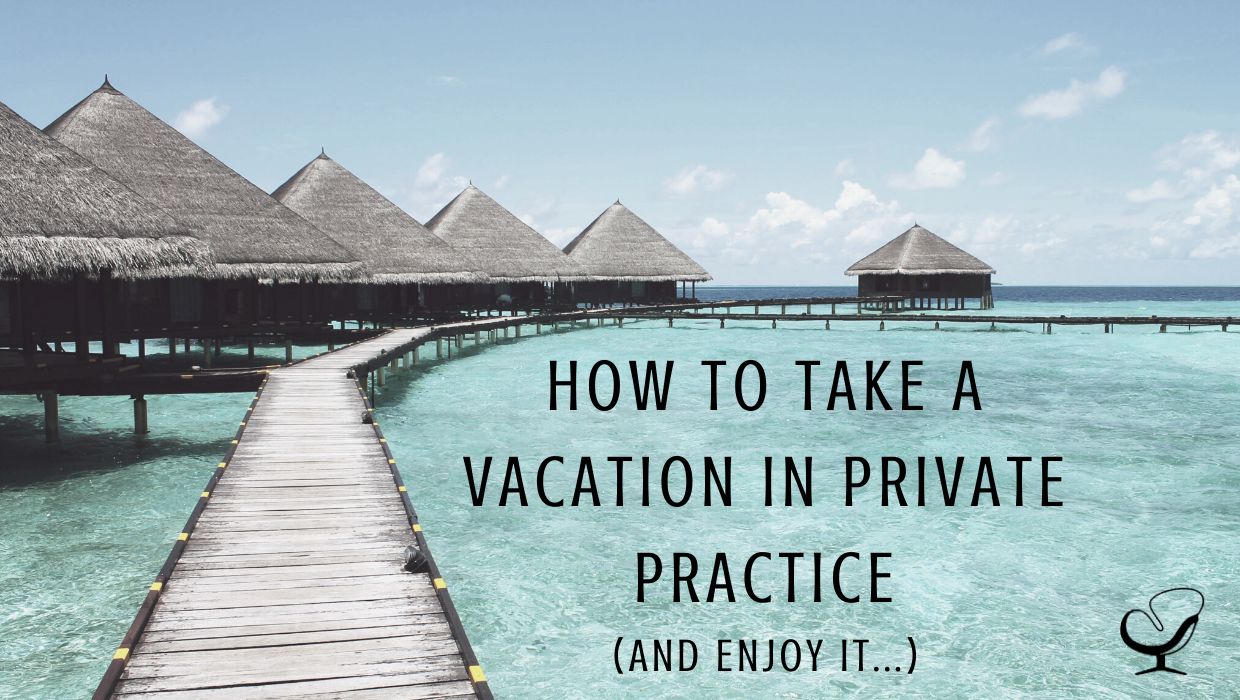My Journey in Learning How to Take a Vacation in Private Practice
Before sharing how to take a vacation in private practice, I have a confession to make. As much as I couldn’t wait to up and leave to go run my own practice after putting in so many years working at the hospital, the “Golden Handcuffs” probably held me back from leaving earlier. After years of being denied holidays with my kids, or not having enough time to fit in a long vacation after taking off all the teacher workdays or 3-day weekends to be home, I had finally reached enough seniority. I was the one being approved first for holidays. Finally, I was able to be home with my kids and take a long vacation. And, I was burned out and ready to leave.
A Private Practice Owner’s Dilemma
Yet, I grappled with leaving just the same. How could I leave knowing that I had all of that paid time off per year? Time where I could just leave and know my patients would be taken care of?
I would hesitate leaving because I wondered if I’d be able to take time off once I was in my own practice. Certainly, I would not be able to get paid if I was not seeing patients. I would also not have an entire hospital staff there to handle any one of my patients who happened to call in crisis while I was gone. I talked myself out of leaving more times than I can count, simply because I was afraid that once I left, I would never, ever have a break again.
Yes, I catastrophized.
Many of my colleagues who had decided to leave to run their own practices before me would tell me that they had the same fears. They would tell me that they understood. And, then they would all tell me that I would never regret leaving. That one day I would look back and wonder why I took so long. And guess what? They were right. And, I was also right. Taking time off from the hospital was nothing like taking time off from my practice is. But, it’s not impossible or as scary as I was making it out to be, either.
So, for anyone out there wondering, here are some ways I have figured out how to take some time off from my practice:
How to Take a Vacation in Private Practice
Plan Ahead
I found that by planning time off well enough in advance (at least a month), I was able to get several important things in place, rather than scramble last-minute to try and then leave worried I had missed or forgotten something. After all, the whole point of going away is to relax and come back refreshed. I will go into more detail about what there is to plan ahead for, but I think the first thing really is to give yourself enough time to prepare your patients – and your practice – for you to be gone.
Establish A Plan
Deciding what to do when you are gone if a patient needs you or is in crisis is necessary. Perhaps finding another colleague in practice who is willing to be on-call for you is an option. If so, you will need to consider any State confidentiality laws and HIPAA privacy provisions in regard to informing your patients about who is covering for you and getting their permission to speak with that provider about their treatment. You could also add this information as well as any procedural information about what to do in a crisis (call 911 or go to the nearest Emergency Room) into your informed consent forms that they read and sign before working with you.
Tell Your Patients
In the time before you go, informing your patients of when you will be leaving and returning is important. However, it’s also important to discuss what to do should they be in crisis during the time you’re unavailable. Even if this information is in their consent forms. They may not remember it.
Do The Math
When I was first working in my practice full time, I could not justify taking one hour off. I was actually scared that I would lose business if I left for too long. After all, I was trying to build my business. Why on earth would I think to leave and risk losing any momentum I was starting to build up? In my mind, I kept thinking that it was “so much easier” when I was working for someone else and I was still getting paid when I was on vacation. Now, if I wasn’t working, I wasn’t getting paid. I was actually, in my mind, losing money.
However, I realized that I was actually making much more money in my practice than I ever had been at the hospital. Even after accounting for the overhead and benefits, I was still coming out ahead. So, while I may not have been getting paid while I was out of the office, I was still making more money than if I had stayed at my old job. My reality was that I wasn’t “losing” money by taking some time off. I just wasn’t making even more than I already was. Yet I was still coming out ahead. So, I could decide not to take any time off and make much more money than I had at the hospital. Or, I could still make more than I had at the hospital and allow myself some breaks here and there.
Now, I realize that I was in a fortunate position in my practice to be able to do this. I still stay on top of my finances and “do-the-math,” making sure that I’m financially able to take time off.
I don’t believe I am unique in this situation. Most therapists that I know with their own practices take vacations and maintain thriving practices to live balanced, happy lives.
If you’re thinking of leaving your full-time job for private practice, I’d suggest reading the below articles:
When to Leave Your Full-Time Job For Private Practice
Do What You Love, Love What You Do
About Cristina Castagnini, Ph.D., CEDS
 Cristina Castagnini, Ph.D., CEDS, is a licensed psychologist and is recognized as a Certified Eating Disorder Specialist by the International Association of Eating Disorder Professionals (IAEDP). She graduated with honors, earning her bachelor’s degree in psychology from The University of California, Santa Cruz, her Master’s Degree in clinical psychology (with an emphasis in Marriage and Family Therapy) from Pepperdine University, and her doctoral degree in counseling psychology at the University of Southern California. Find out more here. Listen to Cristina’s Behind the Bite Podcast Series here.
Cristina Castagnini, Ph.D., CEDS, is a licensed psychologist and is recognized as a Certified Eating Disorder Specialist by the International Association of Eating Disorder Professionals (IAEDP). She graduated with honors, earning her bachelor’s degree in psychology from The University of California, Santa Cruz, her Master’s Degree in clinical psychology (with an emphasis in Marriage and Family Therapy) from Pepperdine University, and her doctoral degree in counseling psychology at the University of Southern California. Find out more here. Listen to Cristina’s Behind the Bite Podcast Series here.

